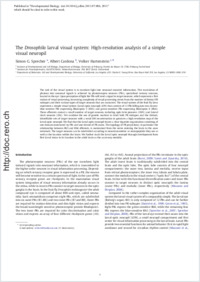The Drosophila larval visual system: High-resolution analysis of a simple visual neuropil
- Sprecher, Simon G. Developmental and Cell Biology Unit, Department of Biology, University of Fribourg, Switzerland
- Cardona, Albert Institute for Neuroinformatics, Uni/ETH Zürich, Switzerland
- Hartenstein, Volker Department of Molecular, Cell and Developmental Biology, University of California, Los Angeles, USA
-
06.07.2011
Published in:
- Developmental Biology. - 2011, vol. 358, no. 1, p. 33-43
English
The task of the visual system is to translate light into neuronal encoded information. This translation of photons into neuronal signals is achieved by photoreceptor neurons (PRs), specialized sensory neurons, located in the eye. Upon perception of light the PRs will send a signal to target neurons, which represent a first station of visual processing. Increasing complexity of visual processing stems from the number of distinct PR subtypes and their various types of target neurons that are contacted. The visual system of the fruit fly larva represents a simple visual system (larval optic neuropil, LON) that consists of 12 PRs falling into two classes: blue-senstive PRs expressing Rhodopsin 5 (Rh5) and green-sensitive PRs expressing Rhodopsin 6 (Rh6). These afferents contact a small number of target neurons, including optic lobe pioneers (OLPs) and lateral clock neurons (LNs). We combine the use of genetic markers to label both PR subtypes and the distinct, identifiable sets of target neurons with a serial EM reconstruction to generate a high-resolution map of the larval optic neuropil. We find that the larval optic neuropil shows a clear bipartite organization consisting of one domain innervated by PRs and one devoid of PR axons. The topology of PR projections, in particular the relationship between Rh5 and Rh6 afferents, is maintained from the nerve entering the brain to the axon terminals. The target neurons can be subdivided according to neurotransmitter or neuropeptide they use as well as the location within the brain. We further track the larval optic neuropil through development from first larval instar to its location in the adult brain as the accessory medulla.
- Faculty
- Faculté des sciences et de médecine
- Department
- Département de Biologie
- Language
-
- English
- Classification
- Biological sciences
- License
-
License undefined
- Identifiers
-
- RERO DOC 24896
- DOI 10.1016/j.ydbio.2011.07.006
- Persistent URL
- https://folia.unifr.ch/unifr/documents/302175
Statistics
Document views: 140
File downloads:
- pdf: 286
